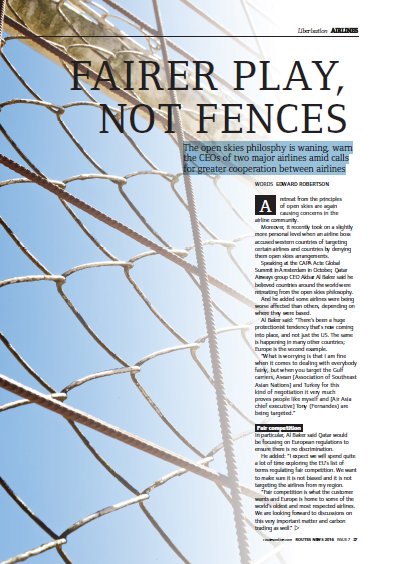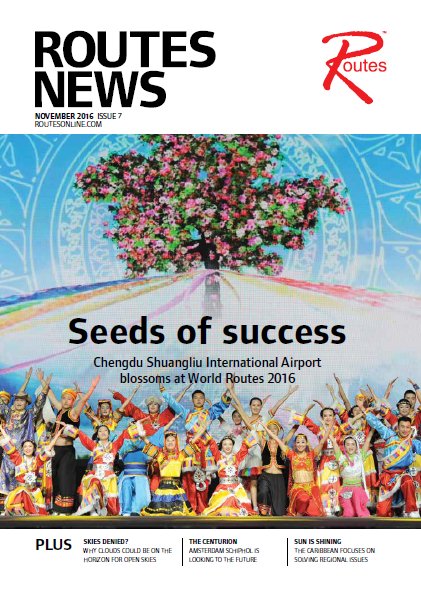A retreat from the principles of open skies are again causing concerns in the airline community. Moreover, it recently took on a slightly more personal level when an airline boss accused western countries of targeting certain airlines and countries by denying them open skies arrangements.
Speaking at the CAPA Acte Global Summit in Amsterdam in October, Qatar Airways group CEO Akbar Al Baker said he believed countries around the world were retreating from the open skies philosophy.
And he added some airlines were being worse affected than others, depending on where they were based. Al Baker said: “There’s been a huge protectionist tendency that’s now coming into place, and not just the US. The same is happening in many other countries; Europe is the second example.
“What is worrying is that I am fine when it comes to dealing with everybody fairly, but when you target the Gulf carriers, Asean [Association of Southeast Asian Nations] and Turkey for this kind of negotiation it very much proves people like myself and [Air Asia chief executive] Tony (Fernandes) are being targeted.”
In particular, Al Baker said Qatar would be focusing on European regulations to ensure there is no discrimination. He added: “I expect we will spend quite a lot of time exploring the EU’s list of terms regulating fair competition. We want to make sure it is not biased and it is not targeting the airlines from my region. Fair competition is what the customer wants and Europe is home to some of the world’s oldest and most respected airlines. We are looking forward to discussions on this very important matter and carbon trading as well.”
He added those countries which were still engaging in open negotiations with airlines were reaping the benefits as a result. Al Baker said: “Countries that are actually opening up to us see that aviation plays an important part and they are now looking at tourism as one of the big drivers in economic development and job creation.”
However, he admitted while both sides taking part in liberalism negotiations needed to be more transparent, airlines such as Qatar Airways needed to be more straightforward following recent and ongoing arguments. He said: “We are accused of being subsidised hugely by governments creating competition that is artificial. All this will disappear when people realise what we’re doing and carriers that are making a noise about us now were doing it years ago.”
Instead, Al Baker said they should learn to better cooperate and cited the example of successes achieved by Qantas and Emirates as well as Qatar’s own relationship with International Airlines Group. “We’re benefitting from each other,” he said. “I’m really very open and we feel cooperation will help each other and we can exchange passengers with one another. “It is no good wasting time trying to [avoid] cooperation.”
Also speaking at the convention, Fernandes agreed that the world appeared to be taking a turn for the worse with open skies. He said: “It [aviation] is probably the most regulated industry anywhere, even banks may be seen as much more open. There’s so much government involvement in airlines it’s been a poor return of capital. While over the last 15 years I’ve seen it liberalise quite a lot, there are threats of protectionism again. We’re seeing it in Asia coming back.”
Will 2017 be the catalyst for change. We spoke to industry expert, John Grant, owner at JG Aviation Consulting to find out his views...
"The past three years for the airline industry have been among the most profitable ever recorded, although a heavy skew towards the strong North American market and success of the low-cost carriers has disguised some continued weakness among other carriers.
"With that success comes growing confidence in the future, with many record aircraft orders, strong growth returning to markets like India and liberalisation taking place around the globe
"That confidence also leads to increased rhetoric from many concerning their global aspirations, what they perceive as the flaws of their competitors and their growing desire for an accelerated rate of change in the market. It’s hard not to sympathise with those views. Next year may represent a defining moment in the industry.
"Deliveries of the next generation Airbus A320neo will gather pace and Norwegian should be receiving the first commercial Boeing 737 MAX in May. In addition, the Airbus A350 and Boeing 787 continue to open new network opportunities that further challenge protectionist air service agreements and stretch not only sector lengths but also the imagination.
"Ultimately, as we are frequently reminded by airline CEOs, there is a need for change and conditions are perhaps better than ever for those big changes required to truly globalise the industry.
"Brexit may be an interesting distraction but it is also an opportunity, while the US election may have been anything other than a discussion of policies. However, both have highlighted future opportunities and resistance to that need for change.
"Aviation leaders are again forcefully picking up this argument. While they may not always win, perhaps in 2017 they will be heard a bit more and might be the catalyst for some of the much needed change we so much require.
"Here’s hoping!"
 |
This article is modified from an original feature that appeared in... ROUTES NEWS - ISSUE 7, 2016 PLEASE CLICK HERE to view the magazine. |
 |





